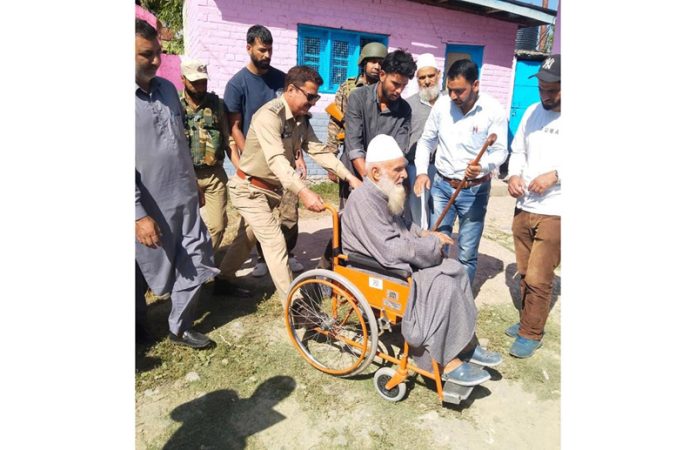
Excelsior Correspondent
Uri, Oct 1: In the third and final phase of elections, elderly voters in Kashmir turned out in significant numbers, driven by concerns over infrastructure, household costs, and unemployment among educated youth.
These voters, including men and women, were seen lining up outside polling stations across 40 constituencies in seven districts, eager to cast their ballots. This phase covered 24 seats in the Jammu region and 16 in the Kashmir Valley, with over 3.9 million registered voters eligible to participate. The Election Commission of India (ECI) had set up 5,060 polling stations to accommodate voters.
Among the elderly voters was an 81-year-old woman in the border town of Uri, who was brought to the polling station by her son on his shoulders to cast her vote. “I hope my vote will bring help to the poor people of this area. Our children are unemployed, and we lack basic amenities like electricity and drinking water. We want all these issues resolved,” she said.
According to the ECI, the electorate for this phase consisted of 2,009,033 men, 1,909,130 women, and 57 individuals from the third gender. It also included 194,000 first-time voters aged 18-19, 35,860 specially-abled individuals, and 32,953 elderly voters over 85 years old.
Tariq Ahmad Mir from Iqbal Nagar, Sopore, expressed his motivation to vote against the Bharatiya Janata Party (BJP), accusing the party of creating fear among the people of Jammu and Kashmir. “They have taken control of our resources, and all the orders issued so far are against the people. This vote is to keep the BJP out,” he said.
In Inderkoot, Bandipora, a 100-year-old voter, Ahmad Dar, hoped for government assistance in his remaining years. “Voting is our right, but no one has ever looked after us. I have never received any help from the Government,” he lamented.
Dar’s sentiment echoed the feelings of many elderly voters who have long felt neglected by authorities. They expressed their desire for government support and accountability in addressing their basic needs.
Hajja, another voter from Hajin, came with her sister, hoping that their candidate would address long-standing issues, including poor roads and lack of drinking water. “I have voted many times, and I am hopeful this time our concerns will be heard,” she said.
Many voters like Hajja shared similar hopes, believing that their participation in the elections could finally lead to positive changes in their communities. They emphasized the importance of holding elected representatives accountable for the promises they make during campaigns.
Mohammad Maqbool Bhat from Tangmarg shared similar concerns, noting that the past decade had seen a lack of representation in governance. He hoped that the current candidates would resolve their long-pending issues.
Abdul Aziz, a voter from Hajin, voiced frustrations over high electricity bills and inflation. “We are struggling with skyrocketing bills, and the youth are facing severe challenges,” he said, hoping for change.
Aziz’s frustrations were common among many voters who voiced their concerns about rising living costs and the need for effective governance to address these pressing issues.

